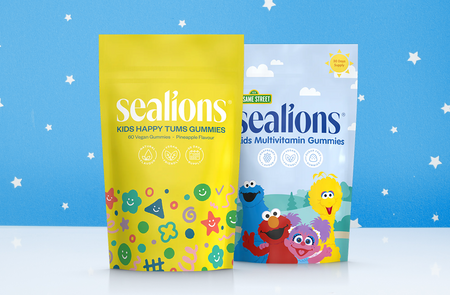
Beat the Back-to-School Bugs This Term
The kids are heading back to school and you can breathe a sigh of relief that the house is looking less like a play area. But the start of a new term can also come with a host of new bugs and illnesses for your little ones to pick up too. Here are five ways you can support children’s immunity as they prepare for the new school year.
Enjoy nourishing nutrition
The best place to start is with a balanced and varied diet, featuring all the colours of the rainbow! Incorporating as many different fruits and veggies as you can into children’s daily diets isn’t always easy, but they’re packed with a huge range of vitamins, minerals, and micronutrients.
Blending up a ‘hidden’ vegetable pasta sauce, or even roasting veggies in tasty seasonings like garlic and ginger are a great way to start introducing new foods in a more palatable way if your child is a picky eater – plus, garlic and ginger have anti-inflammatory, antioxidant, antiviral and antimicrobial properties, so they can have additional benefits for the immune system.
A nutrient-rich breakfast is a great way to fuel your children’s day, and can be so simple to do! The perfect choice if you’re strapped for time on those busy mornings, many breakfast cereals in the UK are fortified with essential nutrients like iron, vitamin D and B12. Fruity dishes like oats and pancakes, or a protein-packed omelette can help give your kids’ day a flying start, and you can rest assured that they’re off to school full of goodness.
Or why not turn your kid’s packed lunch into a team effort? Get their help choosing their favourite sandwich filling, their fruit choice for the day, or healthier options for snacks. Not only does this get them thinking more about the tasty and nutritious foods they’re eating, but gives them a sense of independence too!
Keep their bodies moving
Spending more time sat still as they begin a new year of classes, your child may be getting a little less exercise than they do on an average day in the summer holidays. Staying active helps to boost illness-fighting cells within the body, raises our levels of endorphins (the happiness hormone) and can keep bones and joints strong.
Research indicates that regular moderate physical activity can support overall health in children, and can have a positive impact on other areas of wellbeing such as self-esteem and stress levels. However, it is important to make sure your little one’s exercise isn’t too vigorous – prolonged or particularly intense physical activity can have the opposite effect, causing levels of the stress hormone, cortisol, and inflammation to spike, in turn resulting in a temporary suppression of the immune system, leaving them open to illnesses.
Keeping movement fun is key. Sports clubs after school, a family bike ride, or simply walking the dog in your local park are some simple ways you can get all the family involved.
Set a sleep schedule
Getting enough sleep is vital for our overall wellbeing, and it’s no surprise that children need lots of quality rest to keep them at their happiest and healthiest as they develop and grow. Sleep gives our bodies chance to rest and recuperate, and for those active minds and growing bodies, children aged 3 to 5 years should be getting 10-13 hours sleep, including naps, while children from 6 to 12 years old require between 9 and 12 hours sleep per night.
The relationship between sleep and our immune system is well documented, with researchers finding that poor sleep quality and duration can leave our bodies struggling to fight off illnesses and recover effectively.
Creating a healthy bedtime routine can build consistency with children’s sleep patterns and help their natural body clock settle. A key point in establishing their routine is taking the time to wind down properly before bed – start to prepare around an hour before bedtime by turning off electronic devices, using softer lighting, running a relaxing bath or reading their favourite bedtime story. Try different methods to find the calming rituals that work for you as a family.
Make time for mindfulness
Unfortunately, stress isn’t something that only affects us when we mature into adulthood. Children can become stressed for a number of reasons, such as:
- Big life changes, like moving homes or schools
- Increasing demands of school, exams or homework
- Family problems, such as separations, illnesses, or the death of a loved one
- Experiencing negative thoughts or feelings about themselves
- Problems socialising or making new friends
Studies have long shown a link between increased stress and the negative impacts it can have on our physical health. But what are some practical steps you can take to help reduce your children’s stress levels?
Everything we’ve discussed so far can have a positive effect on mental health – a healthy sleep routine, a balanced diet and an active lifestyle have all been found to help combat stress. And it’s always great to encourage open conversations around mental health within the family, creating an environment where your children feel comfortable sharing their thoughts and feelings.
Research indicates that mindfulness and meditation practices increases activity within the areas of the brain responsible for communicating with our immune system. Using mindfulness techniques promotes relaxation, can reduce feelings of stress and anxiety, increase attention and focus – try apps like Calm or Headspace for breathing exercises and child-friendly meditations.
Try delicious daily gummies
There’s nothing more important than keeping your children healthy. And while we can do our best to encourage a balanced lifestyle to best support their immunity, it’s not always possible to get all of the vitamins and minerals children need through diet alone.
Firstly, some vitamins are simply harder to find in typically child-friendly foods. Take vitamin D for example – also known as the ‘sunshine vitamin’ due to our body’s ability to produce the nutrient when our skin is exposed to sunlight. Some of the best food sources of vitamin D include oily fish, liver and egg yolks, which aren’t the most-loved by children!
Other vitamins are water-soluble, meaning they don’t stay in our bodies for a prolonged period of time. One of these nutrients is vitamin C, which although easier to get in our diet through foods, requires a regular intake to stay at an adequate level.
Vitamins C & D are the 2 most commonly taken supplements in the UK, thanks to their wide-ranging benefits, particularly for immunity and general wellbeing. Our Kids Multivitamin Gummies contain 8 essential vitamins – including C & D – to help safeguard your little one’s diet and make sure they’re getting all the daily goodness they need. Our sugar-free formula helps protect their teeth from unwanted nasties, and they’re suitable for vegans too!
Returning to school after the summer holidays can be daunting for many reasons, but with our top tips, the back-to-school bugs needn’t be one of them.
Tagged:









